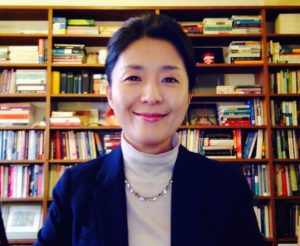
Global Learning, Alternative Thinking with Epistemic Humility
Like higher education in general, religious or theological education also pursues forming and informing not only religious leaders but also responsible citizens. The concept of citizenship here is not necessarily understood in legal terms. In this time of globalization, we need to consider what global citizenship means. While globalization brought interconnectedness and benefits through economic and technological developments to our world and into our homes, it also heightened inequality—especially in the Global South—since the 1980s. The classroom concerned with social justice and civic engagement should stretch beyond the classroom to the global dimension.
When I came to the U.S., I realized my theological training in South Korea had been thoroughly “Western.” I did not arrive in a “new” world. Instead, what was new was my arrival, signifying otherness. Such dissonance began to reveal how distant I am from such West-centered knowledge. As a person from a geographically non-Western world and a non- English speaker, I often feel that Western knowledge is limited and tells only one side of the story or one of many truths.
I was fortunate to have a doctoral advisor who helped me seek not only alternatives, but also an “alternative thinking of alternatives.”[1] I count myself lucky for having taught at a theological school that welcomes such thinking, as well as a global perspective in my teaching. The first course I created was the Global Read of the Bible. The main purpose of this class was ambitious—it explored how the Bible has been received and read not only in the West but also in the Rest. I wanted to introduce students to other ways of reading in global Christian communities, as well as in racial/ethnic minority Christian communities in the U.S. When a professor teaches this kind of course, she may be overwhelmed by the amount, scope, and weight of potential course materials. Contrary to Westerners’ presumption that the non-Western world is void of theological and biblical knowledge, one can’t possibly approach the wealth of knowledges that the Other has produced.
An alternative way of thinking can emerge when perceiving globalization’s impact on the university system or higher education. Under neoliberal capitalism, universities have been privatized and corporatized. The commodification of universities has facilitated the global disparity in academic and education systems where scientific knowledge can be easily appraised for its market value. Some notice that the humanities decline because they have no market worth. What about disciplines such religion and theology?
I am amazed, in these circumstances, at dominant biblical scholarship’s claim of scientific value-neutrality of interpretation. Biblical scholars who identify themselves as historians value the original texts in the ancient languages and their objective meanings. Early Christian studies has particular significance because Western civilization is founded on ancient Greece, the Roman Empire, and Medieval Western Christendom…; the list goes through the Reformation on to liberal democracy. We are fascinated with the Dead Sea Scrolls, but few are interested in the Chinese ancient scrolls, a seventh-century reconstruction of the historical Jesus as the Sutras. What about the Mughal Jesus in India? One may be surprised by the richness of Asians’ portrayals and biographies of Jesus produced in Asian soils of Taoism, Confucianism, Jainism, Hinduism, Buddhism, and minjung, let alone the historical presences of ancient Christianities in Northern Africa such as Egypt, Nubia, and Ethiopia from the first century on.
I do not intend to degrade the significance of the text, interpretive tradition, and the authority of Western scholarship. However, alongside Santos’ concept of the “epistemologies of the South,” I wish to challenge the assumption of the “Eurocentric epistemological North as the only source of valid knowledge,” in contrast to the South as “the realm of ignorance” or absence.[2]
While racial justice demands acknowledging the white privilege of white people, our teaching promoting global justice and civic engagement should likewise recognize the epistemic privilege of the West or the Global North, and plurality of knowledges. Global learning has been available for universities and theological schools with resources in developing international outreach programs, but since the pandemic, our teaching and learning is even more accessible to global, indigenous, and vernacular traditions and knowledges. How do we alternatively think of alternatives to West-centered, capitalist, and elitist educational environments? We must embrace cultural humility, practice deep listening, and being open to solidarity with those struggling for a more just global world.
[1] Boaventura de Sousa Santos, The End of the Cognitive Empire: The Coming of Age of Epistemologies of the South (Durham, NC: Duke University Press, 2018), viii.
[2] Ibid, 7.
Leave a Reply